|
|
|
Sort Order |
|
|
|
Items / Page
|
|
|
|
|
|
|
| Srl | Item |
| 1 |
ID:
138289
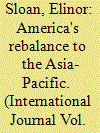

|
|
|
|
|
| Summary/Abstract |
This paper examines the impact of the US pivot to the Asia-Pacific on Canada’s strategic thinking and maritime posture. It highlights elements of the US rebalance before examining Canada’s recent past, present, and future strategic and military engagement. Canada wants to be able to contribute to crisis de-escalation if regional tensions lead to conflict, yet the Royal Canadian Navy has less deployment capacity today than it has had in 25 years. To contribute to mediatory influence, and provide warfighting capability, a recapitalized navy should increase deployments to the region, forward deploy some naval assets, and ensure interoperability with its US counterpart. In the event of a crisis, a choice might have to be made between a neutral, honest-broker stance and a more likely decision to contribute forces to a US-led coalition. The first step in either case is to be in the Asia-Pacific region with capable and credible naval forces.
|
|
|
|
|
|
|
|
|
|
|
|
|
|
|
|
| 2 |
ID:
138288


|
|
|
|
|
| Summary/Abstract |
North Atlantic Treaty Organization (NATO) members such as Canada and Denmark have transformed their military forces to better engage in expeditionary warfare. They are incorporating advanced technologies to find and strike targets precisely from great distances at little risk to themselves. The persistence of unmanned aerial vehicles (UAVs) represents the next step in modern airpower’s long-range reconnaissance/precision strike complex and has transformed ground operations. Nonetheless, operational requirements in Afghanistan caught Canada and Denmark flat-footed. Ultimately, Canada effectively used UAVs while Denmark could not. Moreover, neither state has a UAV capability beyond small tactical systems (although each has plans to develop or join in the development of larger ones). The Canadian and Danish experiences suggest that ground forces are most likely to acquire and integrate small UAVs into their force structures and concepts of operation and that the air forces of small- and medium-sized Western countries will likely do so only in cooperation with others. It is here that the Canadian and Danish UAV paths may yet again cross.
|
|
|
|
|
|
|
|
|
|
|
|
|
|
|
|
| 3 |
ID:
138286
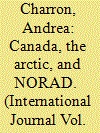

|
|
|
|
|
| Summary/Abstract |
The Arctic is perceived as an area that requires increased North American Aerospace Defense Command (NORAD) attention. On the one hand, the region has always been of particular concern to NORAD, especially during the Cold War. From this perspective, attention to the Arctic is business as usual. On the other hand, increased potential traffic in the region due to warmer temperatures, natural resource exploitation, and tourism could increase threats to North America and create the need for a new NORAD posture. This paper reviews the challenges facing the Arctic, the perceived new urgency for attention, the command and control structures of NORAD, and NORAD’s specific preoccupations in order to answer the question: does the Arctic represent status quo for NORAD or does NORAD need to change, fundamentally, its approach to the North? This paper ultimately argues for the former.
|
|
|
|
|
|
|
|
|
|
|
|
|
|
|
|
| 4 |
ID:
138287


|
|
|
|
|
| Summary/Abstract |
During the 1950s, Canada and the United States worked together to develop a North American air defence system. While the military cooperation generally worked well, some difficulties did occur. These problems in the relationship were almost always the result of concerns from within the Canadian government and the Department of External Affairs that the air defence measures posed political problems and were a threat to Canada’s sovereignty. In the fall of 1954, opposition to further improvements to the continental air defence system emerged from a different source: General Charles Foulkes, the chairman of the Chiefs of Staff Committee. He believed that radioactive fallout from ground bursts of thermonuclear weapons in a war with the Soviet Union would pose insurmountable problems for the air defence effort. Thus, the countries needed to conduct a joint reappraisal of the air defence problem. This article will explore Foulkes’ position and examine what lessons can be drawn from this experience.
|
|
|
|
|
|
|
|
|
|
|
|
|
|
|
|
| 5 |
ID:
138290


|
|
|
|
|
| Summary/Abstract |
This paper asks: why do Canadians oppose trade deals with Asian countries but support them with Europe? While many Canadians view Asia’s economically dynamic countries as important to Canada’s future prosperity, they are hesitant to formalize ties with the same type of trade agreements they are willing to offer traditional trading partners. Using polls conducted by the Asia Pacific Foundation of Canada, this paper identifies the demographic and attitudinal basis for the ‘‘trade support gap.’’ It finds that the gap is driven by factors that go beyond economic interest. Canadians prefer to strengthen economic ties with democratic countries that have strong human rights records. Furthermore, those who are worried that foreign control of the economy threatens national security and those who prefer ties with traditional allies are likely to support trade with the EU but not with Asian and other non-Asian emerging economies.
|
|
|
|
|
|
|
|
|
|
|
|
|
|
|
|
| 6 |
ID:
138285
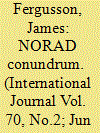

|
|
|
|
|
| Summary/Abstract |
Concerns about the future of the North American Aerospace Defense Command (NORAD) have forever dominated Canadian policy considerations regarding participation in the US missile defence program. Yet, fears that a Canadian decision not to participate could lead to the ‘‘demise’’ or marginalization of NORAD appear entirely unfounded in the wake of the formal Canadian refusal in 2005. This article identifies the reasons behind these fears relative to the nature and future of NORAD, and explains why they are both understandable and misplaced. Since the United States neither has, nor has ever had, a significant system requirement for Canadian participation, Washington has separated missile defence from the NORAD question. While this change in approach and legitimate concerns about NORAD’s marginalization have been managed through a Canadian military space contribution, it is likely that missile defence and military space cooperation will be managed on a bilateral basis largely outside of, and in support of, existing NORAD missions. This process reflects the reality of Canada–US North American defence cooperation, and NORAD’s limited place within it.
|
|
|
|
|
|
|
|
|
|
|
|
|
|
|
|
| 7 |
ID:
138284
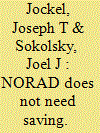

|
|
|
|
|
| Summary/Abstract |
In the current Canadian discussion of missile defence, it is often claimed that the future of the North American Aerospace Defense Command (NORAD) is under threat and that it will be saved only if Canada opts in. The command does not need saving, however. Any such claim draws attention away from the real North American defence challenges that Canadians need to face in a debate about continental strategic defence: whether or not Canada needs to be protected by a missile defence system (a point that a Senate committee strongly emphasized in 2014) and what Ottawa needs to do about its own air defences that fall under NORAD.
|
|
|
|
|
|
|
|
|
|
|
|
|
|
|
|
| 8 |
ID:
138293


|
|
|
|
|
| Summary/Abstract |
This article reviews Joseph Jockel’s classic study of bilateral Canadian–American defence arrangements during the early Cold War: No Boundaries Upstairs. It considers the political context in which Jockel wrote and highlights the bilateral experiences that contributed to his unique perspective. It also reviews Jockel’s account and analysis of the evolution of Canadian–American continental defence cooperation from 1945 to 1958. Finally, this article describes the longevity of Jockel’s analysis as well as how historians and political scientists continue to build on his research.
|
|
|
|
|
|
|
|
|
|
|
|
|
|
|
|
| 9 |
ID:
138292
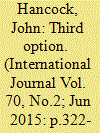

|
|
|
|
|
| Summary/Abstract |
Lately, Mitchell Sharp’s 1972 Third Option paper has acquired a new resonance—and a new readership—as Canada again finds itself worrying about dependence on the United States and revisiting dreams of new economic linkages overseas. Although the Third Option was seen at the time as a radical new call for Canadian economic and cultural independence, it was actually the latest chapter in a long-running foreign policy debate about whether Canada’s economic future lay in embracing—or resisting—the powerful pull of continentalism. This article re-examines Sharp’s Third Option initiative against that broader historical background. It argues that the Third Option, like Canada’s previous quests for economic independence, was prompted as much by fears of rising US protectionism as by concerns about eroding Canadian sovereignty. The paper also notes that the Third Option, again like past efforts at trade diversification, largely failed, and that Canada–US integration only deepened in the decade after Sharp launched his initiative. However, the long-run trend toward growing dependency on the United States may finally be reversing, and Canada’s trade and investment flows overseas are likely to increase in the decades to come. This paper argues not for a re-heated Third Option but for a fourth one instead—the simultaneous pursuit of continental and global integration.
|
|
|
|
|
|
|
|
|
|
|
|
|
|
|
|
| 10 |
ID:
138291


|
|
|
|
|
| Summary/Abstract |
Three times in the span of 12 years (1968–1980), the foreign policy of the Canadian government was subjected to review by the Department of External Affairs. Although only the first of these efforts resulted in a white paper formally tabled as such in the House of Commons, subsequent reviews tended to follow the design of the first: a comprehensive examination of all aspects of the country’s foreign policy, led and coordinated by senior officials in External Affairs, drawing to varying degrees on expertise from other government departments and the private sector. In all cases, the reviews were intended to produce a document that would guide future policy. They served as useful tools not only for new governments seeking to differentiate their policies from those of their predecessors, but also for those in search of answers to challenges arising in the course of their mandates. This article analyzes the reviews undertaken between 1968 and 1980 and the circumstances that gave rise to them in an effort to account for the popularity of the white paper process among policymakers and to explore the process’s influence on policies subsequently pursued.
|
|
|
|
|
|
|
|
|
|
|
|
|
|
|
|
|
|
|
|
|